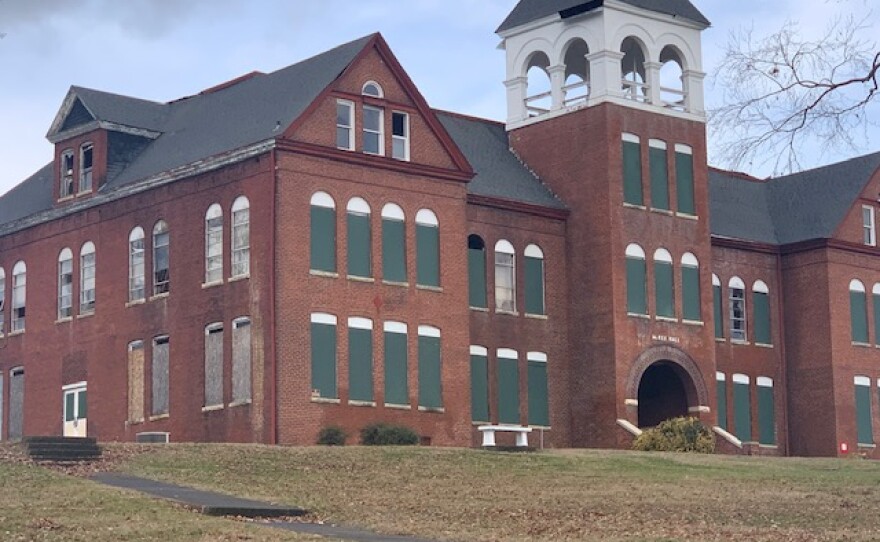Abandoned, dilapidated buildings stand on the once- lively Knoxville College campus in Mechanicsville. Vibrant flags with the school’s motto, “Let There Be Light”, sway back and forth on the campus’s streetlights. A modular building which acts as an administrative office and future classroom site is tucked behind the crumbling science building and theater.
Leonard Adams, the president of Knoxville college and a housing developer based in Georgia, plans to invite commuting students back to the 54-acre campus this fall.
“Our goal, ultimately in our 10-year plan is to reach 1,101 students total,” Adams said in an interview. “That's a mixture of campus, commuter and online. On campus, our goal is roughly only around 500 students total.”
In December 2023, Adams said the college’s accreditation application through the Transnational Association of Christian Colleges and Schools, also known as TRACS, would be submitted pending an audit. In January, TRACS confirmed that they had just begun their application. Without accreditation, the college is not eligible for state or federal financial aid.
The nearly 150-year-old school lost its accreditation in 1997 in part for issues with financial stability. It went fully online in 2018 after closing its doors. The remaining buildings were boarded up or demolished. The land is now worth millions of dollars.
“It has so much culture. It's a rich heritage,” said Dasha Lundy, the former vice president of Knoxville College. “There's something about that school that is very special. And there's so much we can do that can serve our community.”
Lundy said that most students live out of state, including Florida, something confirmed by a former student, Sherry Roberts.
“There's not a large number of students from Tennessee,” Roberts said. “I've not met any students online that say they lived in Tennessee.”
Roberts lives in Gainesville, Florida. When she heard about Knoxville College’s free, two-year associate degree program online, she and her daughter decided to enroll.
“We were told that they were creating a roadmap in order to get the accreditation back,” Roberts said. “So we were thinking that it would happen while we were attending.”
Following graduation last May, Roberts had trouble finding a good-paying job.
“I had two interviews with their degree,” Roberts recalled. “When I told everybody that is not accredited, it was like, ‘Hey, your pay is going to be at starting level, or we can't promote you’.”
Roberts had mixed feelings about the college’s administration, despite a positive experience with her professors.
“At the end of the day, we feel like we are like guinea pigs. We were being used ... to help them get their credit," she said.
Financial Challenges
Under TRACS’s guidelines, an institution seeking accreditation must exhibit financial stability. The administration and board members are responsible for regularly evaluating and managing financial operations of the institution.
According to its recent Form 990, the school is $1.8 million in debt. Public records show that the campus still owes over $129,000 in federal tax liens to the IRS. The College also owes the city of Knoxville over $20,000 in property liens and $28,000 in property tax.
Recently, the administration extended the maturity date of its 21-year- old $5.5 million loan from Foundation Capital Resources, which provides mortgage financing to churches and ministries. Foundation Capital Resources did not respond to questions about the terms or status of the loan.
Neither Leonard Adams nor the chair of the board, Michael Bowie, responded to follow-up questions about the financial viability of the college, after multiple attempts to contact them. Most of the board members, including Bowie, do not live in Knoxville.
“The role as administrator of a school should be fundraising and really building relationships,” Lundy said. "But when you don't live in Knoxville, that's kind of hard.”
Dangerous Campus
The campus has experienced fires and break-ins at the blighted campus over the years. To prevent this, the city of Knoxville allocated $400,000 to board up more buildings. The college will also be responsible for that cost.
“We want to protect members of the public,” said Grant Rosenberg, the chief operating officer of the City of Knoxville. “But more importantly, are members of our public safety personnel that continuously respond and enter dangerous, blighted buildings.”
Public records show that a number of complaints have been filed against the school’s campus for the condition of the buildings, listing them as unfit for human habitation. Rosenberg said the city received "well over 100 complaints" in recent years regarding the campus.
Proposals made by local developers to revitalize the campus throughout the years fell through, including plans to build an apartment complex in 2022, after rezoning the school’s sports field. Recently, the city broke ground on a $220 million redevelopment project near campus that will create nearly 500 affordable housing units. The college was excluded from that deal.
“If I were a hardworking citizen and I got the key to my new housing units, and I looked out [and saw the campus, I would think] you know, what part of town did I get dumped in?” said Jeff Talman, a local renovation specialist.
When Talman ran for mayor, he proposed to turn the campus into a mix-use development to boost housing inventory in the city.
“The really pretty historic buildings that are on the hillside with commanding views of the city and the mountains and the University of Tennessee are not salvageable,” Talman said.
Adams did not respond to questions asked by WUOT about updates on proposed developments on the campus. Despite concerns about the school’s campus and financial viability, there is support among the alumni and community.
“If I had to do it all over again, I said I would do it if they were accredited,” Roberts said. "Let there be light at KC.”











